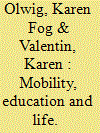| Srl | Item |
| 1 |
ID:
144347


|
|
|
|
|
| Summary/Abstract |
This article traces the multiple ways of ‘manufacturing’ Islamic lifestyles in the urban environment of Tajikistan's capital city, Dushanbe. The city's bazaars serve as a lens through which to observe the conjunction of its booming trade business with Dubai alongside its growing Islamic commodity culture and a religious reformism that is inspired by the materiality and non-materiality of a progressive and hybrid Dubai Islam. Bringing together long-distance trade, urban consumption practices and new forms of public piety in the mobile livelihood of three bazaar traders and sellers, the article provides insights into how the commodification of Islam informs notions of urbanity and modernity in Tajikistan. These notions correspond to the launching of urban renewal and the meta-narrative of Dushanbe's future as a modern city on the rise. Furthermore, the article illustrates the ways in which Dushanbe's Muslims turn bazaars into an urban laboratory for religious agency and cultural identities.
|
|
|
|
|
|
|
|
|
|
|
|
|
|
|
|
| 2 |
ID:
137921


|
|
|
|
|
| Summary/Abstract |
Travel for educational purposes, once the privilege of the upper class, has become a global mass phenomenon in recent years. This special issue examines, within different cultural and historical contexts, the close relationship between migration, education and social mobility. Adopting the perspective that education includes a broad range of formative experiences, the articles explore different educational trajectories and the local, regional and transnational relations in which they are embedded. Three key issues emerge from the analyses: firstly, the central role of temporality in terms of both the overall historical conditions and the specific biographical circumstances shaping educational opportunities; secondly, the complex agendas informing individuals’ migration and the adjustment of these agendas in the light of the vagaries of migrant life; and thirdly, the importance of migrants’ self-perception as ‘educated persons’ and the invention of new, and the maintaining of old, identities that this involves.
|
|
|
|
|
|
|
|
|
|
|
|
|
|
|
|